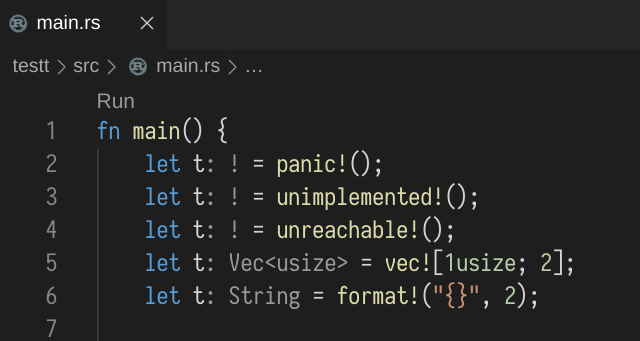1951: Lower the precedence of the `as` operator. r=matklad a=goffrie
Previously, the `as` operator was being parsed like a postfix expression, and
therefore being given the highest possible precedence. That caused it to bind
more tightly than prefix operators, which it should not. Instead, parse it
somewhat like a normal binary expression with some special-casing.
Fixes#1851.
Co-authored-by: Geoffry Song <goffrie@gmail.com>
1928: Support `#[cfg(..)]` r=matklad a=oxalica
This PR implement `#[cfg(..)]` conditional compilation. It read default cfg options from `rustc --print cfg` with also hard-coded `test` and `debug_assertion` enabled.
Front-end settings are **not** included in this PR.
There is also a known issue that inner control attributes are totally ignored. I think it is **not** a part of `cfg` and create a separated issue for it. #1949Fixes#1920
Related: #1073
Co-authored-by: uHOOCCOOHu <hooccooh1896@gmail.com>
Co-authored-by: oxalica <oxalicc@pm.me>
Forbidding block expressions entirely is too strict; instead, we should only
forbid them in contexts where we are parsing an optional RHS (i.e. the RHS of a
range expression).
Previously, the `as` operator was being parsed like a postfix expression, and
therefore being given the highest possible precedence. That caused it to bind
more tightly than prefix operators, which it should not. Instead, parse it
somewhat like a normal binary expression with some special-casing.
1815: Support correct `$crate` expansion in macros r=uHOOCCOOHu a=uHOOCCOOHu
This PR makes normal use cases of `$crate` from macros work as expected.
It makes more macros from `std` work. Type inference works well with `panic`, `unimplemented`, `format`, and maybe more.
Sadly that `vec![1, 2, 3]` still not works, but it is not longer an issue about macro.
Screenshot:

Co-authored-by: uHOOCCOOHu <hooccooh1896@gmail.com>
1848: Parse `..` as a full pattern r=matklad a=ecstatic-morse
Resolves#1479.
This PR implements [RFC 2707](https://github.com/rust-lang/rfcs/pull/2707) in the parser. It introduces a new `DotDotPat` AST node modeled on `PlaceholderPat` and changes the parsing of tuple and slice patterns to conform to the RFC.
Notably, this PR does *not* change the resulting AST when `..` appears in a struct pattern (e.g. `Struct { a, b: c, .. }`). I *think* this is the behavior mandated by RFC 2707, but someone should confirm this.
Co-authored-by: Dylan MacKenzie <ecstaticmorse@gmail.com>
1743: Support `#[macro_use]` on `extern crate` r=matklad a=uHOOCCOOHu
Unfortunately, #1688 is still an issue. My guess is wrong :(
Co-authored-by: uHOOCCOOHu <hooccooh1896@gmail.com>
1734: Strip indents and empty lines in check_apply_diagnostic_fix_from_position r=matklad a=matklad
Co-authored-by: Phil Ellison <phil.j.ellison@gmail.com>
1721: Impl/dyn trait r=flodiebold a=flodiebold
This adds support for `impl Trait` and `dyn Trait` types as far as possible without Chalk. So we can represent them in the type system, and handle them in method resolution, but Chalk doesn't know about them yet. There's a small temporary hack here where we bypass Chalk during method resolution, so we can handle simple method calls on them and completion works.
Fixes#1608.
1723: Make sysroot use `RUST_SRC_PATH` if set r=matklad a=bkchr
Co-authored-by: Florian Diebold <flodiebold@gmail.com>
Co-authored-by: Bastian Köcher <git@kchr.de>
- refactor bounds handling in the AST a bit
- add HIR for bounds
- add `Ty::Dyn` and `Ty::Opaque` variants and lower `dyn Trait` / `impl Trait`
syntax to them
1661: Parse function parameters attributes r=matklad a=eupn
Fixes#1397. The [RFC-2565](https://github.com/rust-lang/rfcs/blob/master/text/2565-formal-function-parameter-attributes.md) specifies `#[attributes]` to function parameters:
```rust
fn foo(#[attr] a, #[unused] b, #[must_use] ...) {
// ...
}
```
This PR adds those attributes into grammar and to the parser, extending corresponding inline tests.
Co-authored-by: Evgenii P <eupn@protonmail.com>